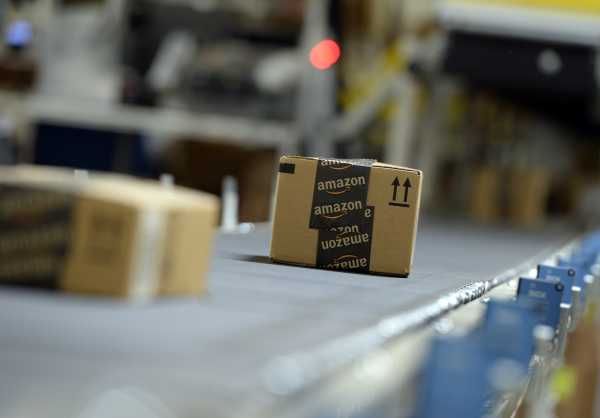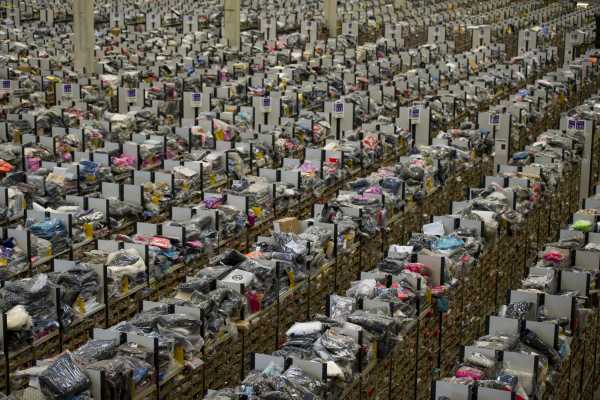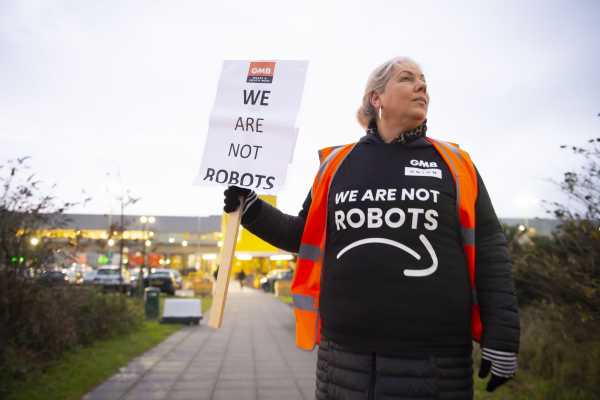

New details have recently been uncovered about alleged conditions inside Amazon warehouses. 911 calls reviewed by the Daily Beast suggest that the tech company’s work conditions are so difficult, they’re apparently causing some employees to want to take their own lives.
The Daily Beast recently got access to records of 189 emergency incidents that occurred at 46 Amazon facilities between December 2013 and December 2018 — when 911 was dialed, as well as when emergency personnel were summoned to a fulfillment center. These calls suggested that the employees demonstrated suicidal tendencies. While their jobs were likely not the sole cause of these tendencies, many employees said Amazon contributed to their struggles.
“Breakdowns” at Amazon facilities, per one former employee, are a “regular occurrence.”
In a statement to Vox, Amazon wrote:
For years, Amazon warehouse workers have spoken up about what they call the company’s poor conditions. These emergency calls illustrate that such conditions can be especially difficult for those already struggling with mental health issues.
In November 2018, Seth King, a former Amazon warehouse employee, told Vox that it took him two months on the job at Amazon to realize that the “grueling, depressing” work was bringing him to “the lowest point in my life.”
“You spend 10 hours on foot, there’s no windows in the place, and you’re not allowed to talk to people — there’s no interactions allowed,” King told Vox. “I got a sense in no time at all that they work people to death, or until they get too tired to keep working. I felt I couldn’t work there and maintain a healthy state of mind.”

Currently, Amazon employs more than 647,000 people around the world, with 125,000 employees working at fulfillment centers in the US. The company is often praised as a major source of employment opportunities. In October 2018, the company also announced it would raise the minimum wage for its workers to $15 an hour.
But accusations that Amazon treats workers poorly have long dogged the e-commerce giant, and King’s accusations were not isolated. From reports about poor air conditioning to timed bathroom breaks to employees being under constant surveillance, the list is long. In December, East African Amazon workers in Minneapolis rallied for fair religious treatment, saying that Amazon’s allotted two 15-minute breaks and one 30-minute break each shift were not enough time for Muslims to pray.
Amazon’s warehouse troubles aren’t unique to the US. Workers in warehouses across Spain, Germany, Italy, and the UK have participated in walkouts, like the ones held on Black Friday 2018 to protest work conditions. GMB, a union that organized protests at Amazon warehouses in England, found in an investigation last year that 600 ambulances visited British Amazon facilities. It also discovered there were 602 reports filed to England’s Health and Safety Executive, with issues including electric shocks, bleeding, trauma, and issues with pregnant women who were forced to stand for 10 hours.
“They are breaking bones, being knocked unconscious, and being taken away in ambulances,” GMB General Secretary Tim Roache said when the Amazon protests for Black Friday were announced. “We’re standing up and saying enough is enough, these are people making Amazon its money. People with kids, homes, bills to pay — they’re not robots.”
If you or anyone you know is considering suicide or self-harm or is anxious, depressed, upset, or needs to talk, there are people who want to help:
In the US:
Crisis Text Line: Text START to 741741 from anywhere in the USA, at any time, about any type of crisis
The National Suicide Prevention Lifeline: 1-800-273-8255
The Trevor Project: 1-866-488-7386
Outside the US:
The International Association for Suicide Prevention lists a number of suicide hotlines by country. Click here to find them.
Befrienders Worldwide
When it comes to the environment inside Amazon warehouses, tales of struggles don’t just come from those who are packing boxes. Managers, too, have said that Amazon encourages them to maintain a pressure cooker environment.
“Amazon never trained us in how to communicate with associates,” one former manager told Vox last November. “We weren’t trained to be understanding of their struggles or communicate with them. It was all about mechanics. “
According to this former manager, one feeling across Amazon is that “workers constantly feel like their jobs are on the line,” and she said that in fact they are. The manager noted that Amazon had an automatic firing system, where workers would be terminated if they took more than an hour break. Workers, the manager said, were also written up if they didn’t keep up with the facilities packing rate, and several write-ups could mean termination.
“We were supposed to be observing their [packing] rate and not be concerned with how hard it is to pack things,” the manager said. “Managers were pressured to identify the weak links and get them out so that we can have a faster rate.”

According to the calls reviewed by the Daily Beast, some emergency calls made from Amazon warehouses appear to be connected with this type of pressure. In one sheriff’s report from December 2017, for example, a woman working at a warehouse in Jacksonville, Florida, said “she was going to go home and kill herself” after she’d gotten fired. A supervisor said they witnessed her hurting herself because she had been fired and felt she “did not have anything to live for,” and the woman told police she had planned to hurt herself.
According to another sheriff report from a facility in Etna, Ohio, filed in July 2018, a man had said that “with all the demands his employer has placed on him and things he’s dealing with in life, [it was] becoming too much,” and that he’d consider hurting himself. The employee, per the report, worked at “Amazon for over a year and is frustrated with his employment because he felt he was lied to by Amazon at his orientation. He keeps saying the company told him they valued his employment and would be treated as if he mattered and not just a number.”
In an email to Vox, an Amazon spokesperson pointed out that suicide is a mental health crisis, and that plenty of large-scale companies are dealing with similar issues.
But these broader environmental problems have been raised by many employees, not just the ones who have reached out for help or expressed struggles with mental health. Khadra Ibrahin, a 28-year-old single mother of two and Somali immigrant in Minneapolis, for example, works at Amazon’s Shakopee fulfillment center and was one of the people rallying for more break times to pray. She said in December that the pressures of the job can make any employee feel bad.
“Every time I walk through those doors, I am filled with dread that tonight is going to be the night that I get fired,” she told Vox. “When you take a job at a warehouse, you have to be mentally and physically prepared for a certain kind of work, but I have never felt threatened by a workplace like this before. I want to keep this job to provide for my family, and I am also working as hard as I can, but you can’t live under this type of pressure. The way Amazon pushes people is not moral.”
Want more stories from The Goods by Vox? Sign up for our newsletter here.
Sourse: vox.com






